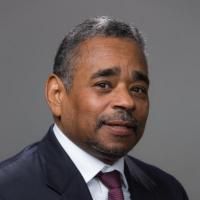Calvin R. Howell, Professor and Director of Triangle Universities Nuclear Laboratory

Office Location: 221 Dfell, Durham, NC 27708
Email Address: howellc@duke.edu
Web Page: http://www.tunl.duke.edu/Directory/Faculty/howell/
Specialties:
Experimental nuclear physics
Biological physics
Education:
Ph.D., Duke University, 1984
Master of Art, Duke University, 1980
Bachelor of Science, Davidson College, 1978
Research Categories: Experimental Nuclear Physics
Current projects: Measurement of the cross section for neutron-neutron quasi-free scattering , in neutron deuteron break; Determination of the s-wave neutron-neutron, scattering length using photodisintegration of the triton; Nuclear structure, studies of nuclei used in the search for neutrinoless double beta decay;, Nuclear reaction measurements important for nuclear security and , homeland security; and Carbon and nitrogen accumulation , and translocation in plants.
Research Description:
Professor Howell is the Director of the Triangle Universities Nuclear Laboratory (TUNL). His research interests are the quantum chromodynamics (QCD) description of structure and reactions of few-nucleon systems, Big Bang and explosive nucleosynthesis, and applications of nuclear physics in biology, medicine and national security. His research includes: studies of few-nucleon reaction dynamics, measurements of the neutron-neutron scattering length, photodisintegration of 3He and the triton, and studies of the carbon and nitrogen accumulation and translocation in plants using short-lived radioactive isotopes and positron emission tomography.
Areas of Interest:
experimental nuclear physics
few-nucleon reactions
nuclear astrophysics
nuclear structure
ecology and plant physiology
material analysis and imaging with gamma-rays and neutrons
Recent Publications (More Publications)
- Tonchev, AP; Silano, JA; Ramirez, APD; Malone, RC; Stoyer, MA; Gooden, ME; Bredeweg, TA; Vieira, DJ; Wilhelmy, JB; Finch, SW; Howell, CR; Tornow, W, Energy dependence of chain fission product yields from neutron-induced fission of 235U, 238U, and 239Pu, Nuclear Data Sheets, vol. 202 (June, 2025), pp. 12-29 [doi] [abs].
- Song, J; Rotsch, D; Nolen, JA; Gampa, R; De Kruijff, RM; Brossard, T; Howell, CR; Krishichayan, F; Wu, YK; Mikhailov, S; Ahmed, MW; Janssens, RVF, Photonuclear cross sections for Au 197: An update on the gold standard, Physical Review C, vol. 110 no. 6 (December, 2024) [doi] [abs].
- Roberts, M; Norum, B; Keller, D; Pywell, R; Sawatzky, B; Chen, H; Crabb, D; Krahulik, T; Howell, C; Ahmed, M, Use of the HIFROST Dilution Refrigerator for the T20 Experiment, Proceedings of Science, vol. 456 (July, 2024) [abs].
- Silano, JA; Malone, RC; Finch, SW; Gooden, ME; Howell, CR; Ramirez, APD; Thomas, K; Tonchev, AP; Tornow, W; Wilhelmy, JB, Characterization of 235U, 238U and 239Pu fission ionization chamber foils by α and γ-ray spectrometry, Nuclear Instruments and Methods in Physics Research Section A Accelerators Spectrometers Detectors and Associated Equipment, vol. 1063 (June, 2024) [doi] [abs].
- Gooden, ME; Malone, RC; Bredeweg, TA; Bond, EM; Finch, SW; Howell, CR; Krishichayan; Ramirez, APD; Silano, JA; Stoyer, MA; Tonchev, AP; Tornow, W; Vieira, D; Wilhelmy, JB, Energy dependence of fission product yields in the second-chance fission region, Physical Review C, vol. 109 no. 4 (April, 2024) [doi] [abs].
Highlight:
Professor Howell’s research is in the area of experimental nuclear physics with emphasis on the quantum chromodynamics (QCD) description of low-energy nuclear phenomena, including structure properties of nucleons and nuclei and reaction dynamics in few-nucleon systems. The macroscopic properties of nucleon structure and the residual strong nuclear force between neutrons and protons in nuclei emerge from QCD at distances where the color interactions between quarks and gluons are strong. However, the details of the mechanisms that generate the strong nuclear force are not well understood. Effective field theories (EFT) and Lattice QCD calculations provide theoretical frames that connect low-energy nuclear phenomena to QCD. Professor Howell and collaborators are conducting experiments on few-nucleon systems that test predictions of ab-initio theory calculations for the purpose of providing insight about the QCD descriptions of low-energy nucleon interactions and structure. His current projects include measurements of the electromagnetic and spin-dependent structure properties of nucleons via Compton scattering on the proton and few-nucleon systems and studies of two- and three-nucleon interactions using few-nucleon reactions induced by photons and neutrons. In the coming years, a focus will be on investigating the neutron-neutron interaction in reactions and inside nuclei. In addition, his work includes applications of nuclear physics to national nuclear security, medical isotope production, and plant biology. Most of his research is carried out at the High Intensity Gamma-ray Source and the tandem laboratory at TUNL.
- Current Ph.D. Students
(Former Students)
- Zhonglin Han
- Brent Fallin
- Forrest Friesen
- David Ticehust
- Larry Cumberbatch
- Postdocs Mentored
- Robert A. Macri (March 01, 2004 - September 30, 2004)
- Shigeyuki Tajima (January 1, 2004 - August 31, 2004)
- Alexander S. Crowell (January 1, 2002 - December 31, 2007)
- Steve Churchwell (1998/01-2001/08)